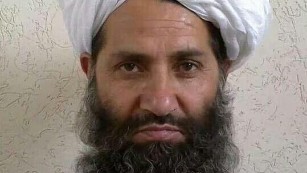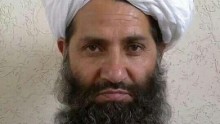New Taliban leader vows: No peace talks; 'terror on enemies' will continue
The new Afghan Taliban leader has told commanders and the group's supreme leadership council that there will be no peace talks with the Afghan government, a source in the group reached through an intermediary said Wednesday.
The source said that Mawlawi Haibatullah Akhundzada, newly appointed to lead the terror group after a U.S. drone strike killed Mullah Akhtar Mohammed Mansour, will follow the militant policies espoused by founder Mullah Omar, killed in Pakistan in 2013.
The source said that the appointment of Akhundzada "will bring back the era of Mullah Mohammad Omar," referring to the one-eyed mujahedeen commander who led the group from its inception in 1994, with "a simple life, loyalty, and terror on enemies."
The Taliban has made strong battlefield gains against government forces in recent months, driving back Afghan troops from key positions and launching a string of bombings in Kabul.
On Wednesday, as the new leader was announced, the group claimed responsibility for a suicide bombing in the capital that killed 10 people and injured four others, including two children.
OPINION: Challenges for new Taliban leader
However, Sayed Mohammad Akbar Agha, a founding member of the Taliban who lives in Kabul and says he knows the new leader, told CNN that he is an educated and well-respected man, with more clerical and judicial experience than military, and brokering a peace with him could be easier than Mansour.
Natural choice

Mawlawi Haibatullah Akhunzada, named the new Afghan Taliban leader.
The new Taliban leader belongs to the Noorzai tribe and is in his late 50s --although the Taliban claim he is 47 years old -- and hails from the Taliban heartland in the Panjwai district of southern Kandahar province, according to Agha.
He became Mullah Mansour's deputywhen he succeeded Mullah Omar, and subsequently took an active part in the day-to-day running of the movement, playing a key role in negotiating a ceasefire with a dissident Taliban faction earlier this year.
The senior religious cleric, who hails from its founding generation and was active in the 1980s mujahedeen struggle against the Soviet invasion in the 1980s, is seen as a uniter and his appointment shows the Afghan militant group hopes it will avoid succession disputes, analysts say.
Akhundzada was the "natural choice" to succeed Mullah Akhtar Mohammad Mansour, who was killed in a drone strike in Pakistan on Saturday, said Thomas Ruttig of the Afghanistan Analysts' Network.
Mullah Omar's presence looms large
Along with the stated desire to return to the hardline policies of the group's founder, a statement announcing his appointment also names Mullah Omar's son, Mawlawi Mohammad Yaqoob, in a deputy role.
"(Akhundzada) was already the senior deputy to Mullah Mansour. It's a clever choice because he is a religious scholar from the founder generation of the Taliban, and was close to Mullah Omar," said Ruttig.
"He may therefore be able to integrate the younger and more militant generation," he said.
"The Taliban understood that they needed a new consensus leader, and quickly, to prevent what was possibly the aim of the U.S. and Afghan governments -- to create turmoil around the succession."











